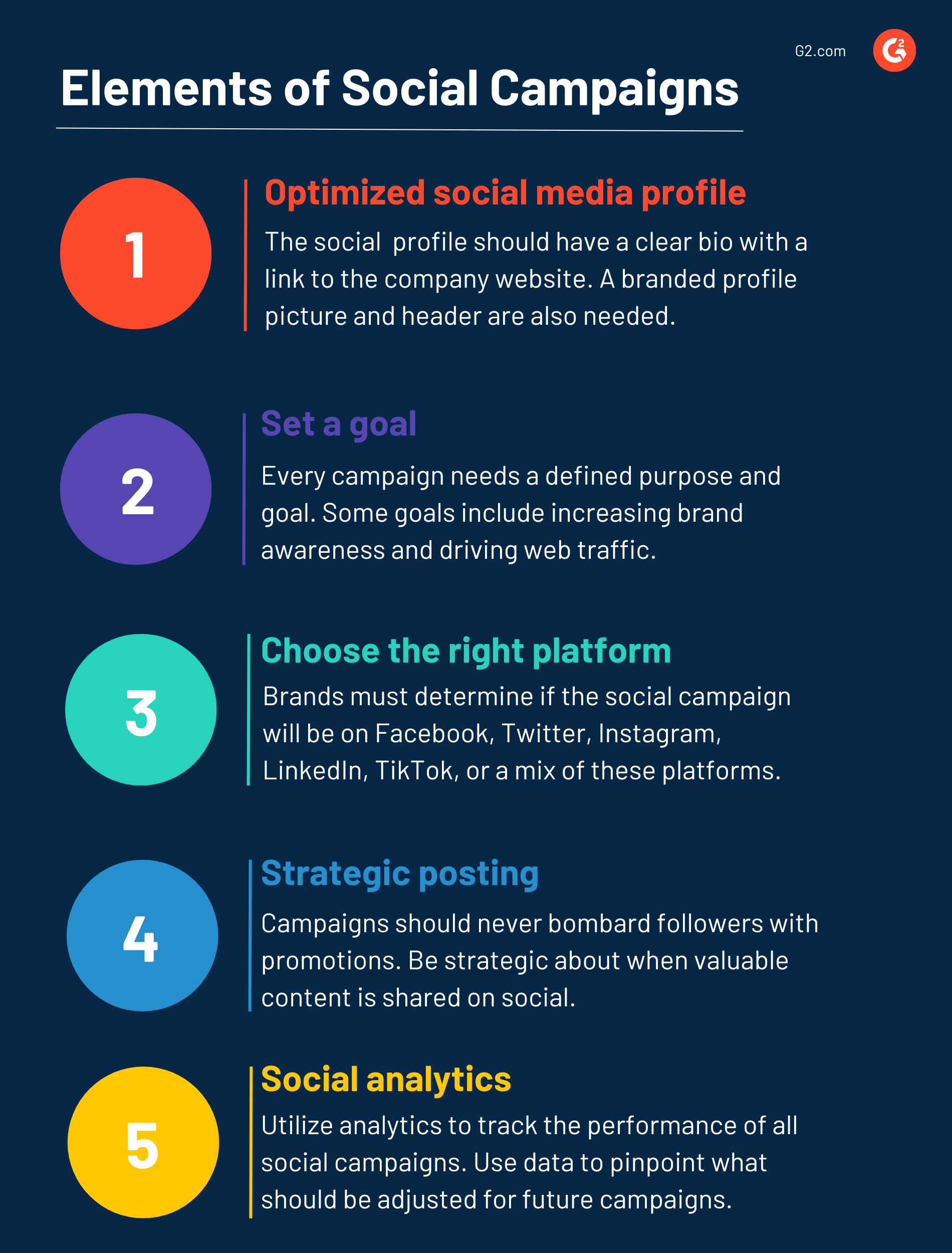What is a social campaign?
A social campaign is a coordinated marketing effort on social media. The purpose of social campaigns is to reinforce or assist an organization with a goal using one or more social media platforms. These campaigns also improve brand awareness, social media user interactions, and other KPIs for an organization. The success of the campaign is measured with analytics and sales revenue outcomes.
Companies use social media monitoring software to run social campaigns. These tools can improve campaign messages to cater to specific consumers and are often the main platform organizations use for consumer engagement and customer insights.
Types of social campaigns
The type of social campaign an organization chooses will ultimately depend on the social media platforms it will run on.
Types of social campaigns to choose from include:
- Polls: Companies may run a poll to collect more insights from their customers, whether it’s their opinion on a product or about user behaviors and preferences. Polls are usually run on Twitter, Facebook, or Instagram Stories.
- Images: An organization may post one image or a series of images based on their products or services on social media. A social campaign with images works on most platforms, but isn’t well-suited for platforms geared toward video, like TikTok.
- Videos: Certain platforms work best for video campaigns, like TikTok or Instagram. It’s best to keep social campaigns that include video under a minute in run time.
Basic elements of a social campaign
No matter the industry an organization is in, a social campaign should include specific elements.

The basic elements of a social campaign are:
- Optimized social media profile: Before beginning a social campaign, the brand’s social media profile should have a clear and compelling bio with a link to the company website. It should also have branded images for the profile picture and header.
- Setting a goal: Organizations shouldn’t be on social media simply for the sake of being on social media. Every social campaign should have a defined purpose and goal. Some goals organization may set include increasing brand awareness, driving website traffic, and generating more leads.
- Choosing the right platform: Brands must determine if the social campaign will be on Facebook, Twitter, Instagram, LinkedIn, TikTok, or a mix of these platforms. Whatever is decided, the content in the campaign needs to be tailored for the chosen platform. Doing so encourages the targeted audience to engage with the content.
- Strategic posting: Social campaigns are not the place for random posts about products or services every minute of every day. Campaigns should never bombard followers with promotions. Be strategic about when valuable content is shared on social.
- Social analytics: At all points during a social campaign, utilize analytics to track its performance. Once the campaign is complete, this data can pinpoint what to change for future campaigns.
Benefits of social campaigns
When done correctly, social campaigns can be very beneficial. Below are some of the benefits a brand can experience.
- Improve brand awareness: Businesses can boost brand awareness through social media by posting campaigns on relevant platforms with applicable hashtags. When a campaign plan is created, decide where and when the details will be posted for maximum efficiency.
- Connect with audiences: Social media campaigns make it easy for brands to connect with a wide range of customers worldwide. These interactions occur in various ways, like follows, comments, and likes.
- Increase website traffic: Including a link to the company website in the social media bio helps guide users and potential customers to learn more about a product or service offered. This link can be to the homepage or a specific landing page on a website. Site links can also be included in social media posts for even more traffic.
- Boost sales: Social campaigns can get customers excited about products and services, likely increasing sales. Getting the word out about new products with enticing images and messaging helps attract customers.
Social campaigns best practices
When launching a social campaign, there are specific best practices to follow for it to be as successful as possible. Keep these best practices in mind the next time a social campaign is around the corner.
- Make it actionable: Ask social media followers to interact with posts or include a call-to-action (CTA). This can be done by encouraging users to ask questions, enter contests, take polls, join mailing lists, or provide reviews.
- Provide incentives: Give customers and social media followers a reason to share information about themselves. Consider prizes, discounts, or exclusive content as incentives.
- Be relevant: Consider trending topics and new stories. On occasion, social campaigns may need to be paused depending on the what is trending. If there is a fun, but relevant, trending topic or hashtag, brands may join in to get noticed.
- Engage with users: Throughout the campaign, answer questions from social media followers and address critiques as fast as possible.
- Promote across accounts: Even if a campaign is specific to one platform, promote it across all social media platforms and accounts. Employees should be encouraged to promote it, too.
- Monitor performance: Pay close attention to the campaign's performance and optimize when needed.

Mara Calvello
Mara Calvello is a Content and Communications Manager at G2. She received her Bachelor of Arts degree from Elmhurst College (now Elmhurst University). Mara writes customer marketing content, while also focusing on social media and communications for G2. She previously wrote content to support our G2 Tea newsletter, as well as categories on artificial intelligence, natural language understanding (NLU), AI code generation, synthetic data, and more. In her spare time, she's out exploring with her rescue dog Zeke or enjoying a good book.





















